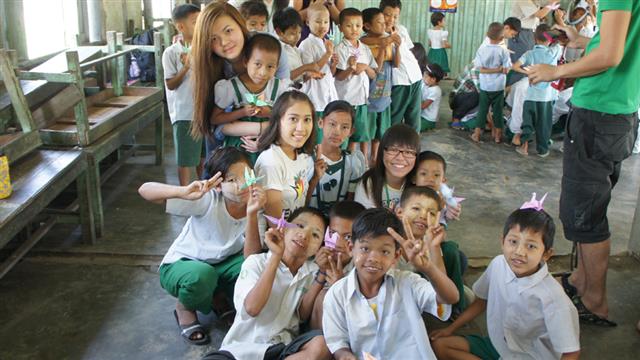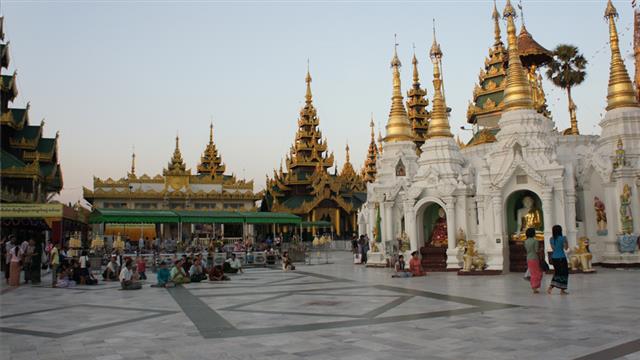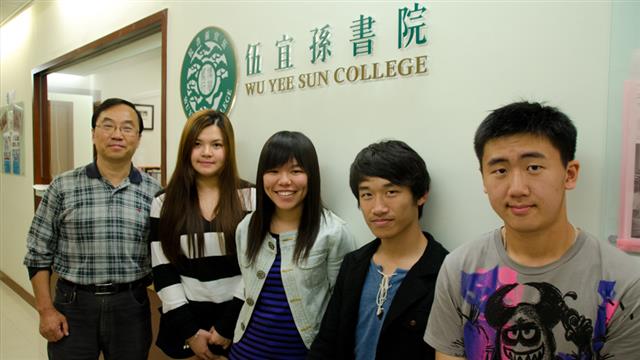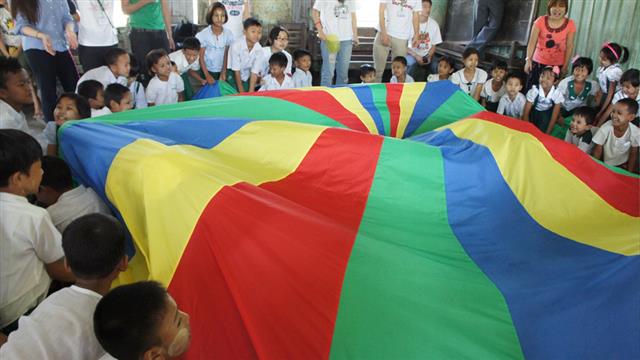Wu Yee Sun College, which admitted its first cohort of students last September, was founded with a mission to instil an entrepreneurial spirit and social responsibility in its students. It strives to foster an innovative and enthusiastic spirit, visionary thinking, and nurture an awareness of social injustices and problems, and a commitment to caring for the underprivileged. Some students from the College recently went on a service trip to Myanmar. And as they will tell you, the mission statement has become a real-life experience for them shaping their personalities and staying in their memories for years to come.
Talking about the tour to Myanmar, Chow Lai-Sze Kim of the Engineering Faculty said, ‘It was an unforgettable experience. I experienced the joy of serving others and the trip gave me many opportunities for introspection. What I gained from such first-hand experience is much more than what I have been learnng from the Internet and from books.’
Wu Yee Sun College held its first overseas service- learning progamme from 4 to 12 January. Students went to Yangon of Myanmar for voluntary service to the underprivileged. They paid visits to slums and a local university. Response to the programme was quite encouraging, with nearly 10% of the College student population applying. However, as places were limited, only 17 students were selected.
Myanmar is the second largest country in Southeast Asia. It has a population of some 60 million, most of whom depend on agriculture for subsistence. In the 1950s, Myanmar was the richest country in Southeast Asia. After the government was taken over by the military, the economy went into a recession.
The tour was led by Mr. Tang Wai-hung, director of the service-learning programme of Wu Yee Sun College and lecturer of the Department of Social Work. Why Myanmar? Mr. Tang explained that as a country close to Hong Kong, Myanmar gives the impression of being mysterious, underdeveloped and closed. It became more open only in recent years and was a place worthy of exploration. Moreover, in this developing country, people live a hard life and have many needs. He hoped the trip can enhance student to develop skills in emergency-handling, problem-solving, coordination and communication, and make them care for society and develop an international outlook.
Possibility of Death a Part of Life
Students joined the programme for different reasons. Tang Kin-tat Gundam from the Science Stream said he only knew from the media that Myanmar was governed by a junta and had no idea how the society and its people were really like. Gundam joined the trip hoping to understand the country more. ‘At first, I didn’t sense political instability had any effect on people’s lives until one day I saw a jet-fighter flying overhead and suddenly was aware that the possibility of death was part of everyday life for the Myanmar people.’
Chan Wai-ki Kiki, also a student from the Science Stream, said she joined the programme to make friends with students from other disciplines so she can view an issue from different perspectives.
She shared with us a touching episode which prompted her to reflect on her life. ‘We visited a local university where the equipment was very primitive. But students were contented and enjoyed school life so much. Compared to us, CUHK has excellent facilities but should we take it for granted? What should our attitude be regarding our possessions?’
To Reflect on One’s Own Culture
Tang Chun-hong Aaron finished his secondary school in the UK and embarked on legal studies at CUHK. When talking to volunteers in Myanmar, Aaron found that although the country was once ruled by the British, people still insisted on maintaining their cultural identity by practices such as wearing ethnic clothing. In Hong Kong, also a former British colony, it is a lot more common to wear western-style clothing. Aaron added that the conversation provoked him to rethink his own cultural identity and how cultural invasion occurred subconsciously in minor areas.
Kim noticed a large difference between students in Hong Kong and those in Myanmar. ‘In Myanmar, children were eager to join in the games and appreciated our efforts. I remembered that once I played with one pupil, all the others flocked to my front and wanted to play together.’ She was moved by them.
Activities held by the CUHK students included singing, playing group games and making handicraft. Kim said the children were easily satisfied. On the contrary, she said, Hong Kong people were always discontented with the status quo. They would always blame the government for the problems in the society. She opined that if everyone compromised a little, it would be more possible to come up with solutions.
Learn to Deal with a Contingency
During the two visits to schools, the number of children attending the activities was more than expected. On the visit to the deaf school, they had estimated that some 20 children would join, but in the end, an astonishing 200 came. This was a challenge as they had to manage the unexpected change in terms of material arrangements, division of labour and activity content. But thanks to previous experience and cooperation among the team members, the activities were run smoothly.
Before the trip, the students had learnt some simple international sign language, but they found that it was not applicable. The rapid motion of the deaf children made it difficult to communicate. In the end, the students implemented the programme with the assistance of impromptu body languages. Mr. Tang said this was similar to real life situations where factors vary and what turns out is completely different from what was expected. Students need to be innovative to deal with sudden changes. He was glad that they had the chance to learn from this incident.
Apart from playing games, students also had to work. The rural school they visited has many farmlands nearby. Student had to assist the school staff to take care of the environment such as transporting stones, painting and weeding. Under a scorching sun, they contributed their bit to the school as its staff had been doing everyday for years.
Kiki said the trip left fond memories for the teachers and children. When they see the tidy stones, the painted walls and the weeded farm, they will remember the youths who paid them a visit and walked with them hand in hand, albeit for a few days.
More Stories
These Wu Yee Sun College students will hold exhibitions to share their experiences of the trip to Myanmar in March. Details are as follows:
|
Date |
11–12/3 |
25–26/3 |
|
Time |
12:30 pm –16:30 pm |
12:00 nn –16:30pm |
|
Venue |
Cultural Square |
Piazza of Yasumoto International Academic Park |






